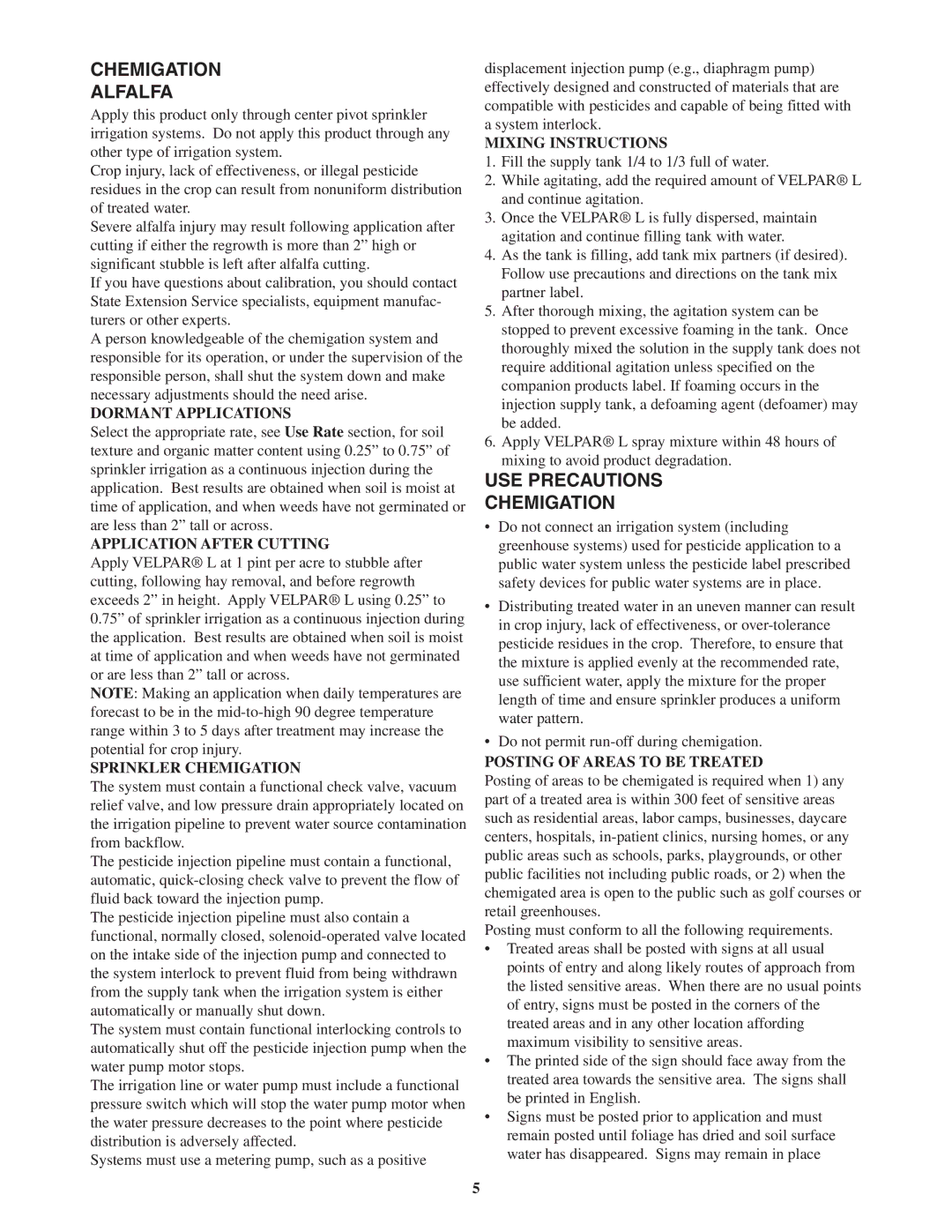CHEMIGATION
ALFALFA
Apply this product only through center pivot sprinkler irrigation systems. Do not apply this product through any other type of irrigation system.
Crop injury, lack of effectiveness, or illegal pesticide residues in the crop can result from nonuniform distribution of treated water.
Severe alfalfa injury may result following application after cutting if either the regrowth is more than 2” high or significant stubble is left after alfalfa cutting.
If you have questions about calibration, you should contact State Extension Service specialists, equipment manufac- turers or other experts.
A person knowledgeable of the chemigation system and responsible for its operation, or under the supervision of the responsible person, shall shut the system down and make necessary adjustments should the need arise.
DORMANT APPLICATIONS
Select the appropriate rate, see Use Rate section, for soil texture and organic matter content using 0.25” to 0.75” of sprinkler irrigation as a continuous injection during the application. Best results are obtained when soil is moist at time of application, and when weeds have not germinated or are less than 2” tall or across.
APPLICATION AFTER CUTTING
Apply VELPAR® L at 1 pint per acre to stubble after cutting, following hay removal, and before regrowth exceeds 2” in height. Apply VELPAR® L using 0.25” to 0.75” of sprinkler irrigation as a continuous injection during the application. Best results are obtained when soil is moist at time of application and when weeds have not germinated or are less than 2” tall or across.
NOTE: Making an application when daily temperatures are forecast to be in the mid-to-high 90 degree temperature range within 3 to 5 days after treatment may increase the potential for crop injury.
SPRINKLER CHEMIGATION
The system must contain a functional check valve, vacuum relief valve, and low pressure drain appropriately located on the irrigation pipeline to prevent water source contamination from backflow.
The pesticide injection pipeline must contain a functional, automatic, quick-closing check valve to prevent the flow of fluid back toward the injection pump.
The pesticide injection pipeline must also contain a functional, normally closed, solenoid-operated valve located on the intake side of the injection pump and connected to the system interlock to prevent fluid from being withdrawn from the supply tank when the irrigation system is either automatically or manually shut down.
The system must contain functional interlocking controls to automatically shut off the pesticide injection pump when the water pump motor stops.
The irrigation line or water pump must include a functional pressure switch which will stop the water pump motor when the water pressure decreases to the point where pesticide distribution is adversely affected.
Systems must use a metering pump, such as a positive
displacement injection pump (e.g., diaphragm pump) effectively designed and constructed of materials that are compatible with pesticides and capable of being fitted with a system interlock.
MIXING INSTRUCTIONS
1.Fill the supply tank 1/4 to 1/3 full of water.
2.While agitating, add the required amount of VELPAR® L and continue agitation.
3.Once the VELPAR® L is fully dispersed, maintain agitation and continue filling tank with water.
4.As the tank is filling, add tank mix partners (if desired). Follow use precautions and directions on the tank mix partner label.
5.After thorough mixing, the agitation system can be stopped to prevent excessive foaming in the tank. Once thoroughly mixed the solution in the supply tank does not require additional agitation unless specified on the companion products label. If foaming occurs in the injection supply tank, a defoaming agent (defoamer) may be added.
6.Apply VELPAR® L spray mixture within 48 hours of mixing to avoid product degradation.
USE PRECAUTIONS
CHEMIGATION
•Do not connect an irrigation system (including greenhouse systems) used for pesticide application to a public water system unless the pesticide label prescribed safety devices for public water systems are in place.
•Distributing treated water in an uneven manner can result in crop injury, lack of effectiveness, or over-tolerance pesticide residues in the crop. Therefore, to ensure that the mixture is applied evenly at the recommended rate, use sufficient water, apply the mixture for the proper length of time and ensure sprinkler produces a uniform water pattern.
•Do not permit run-off during chemigation.
POSTING OF AREAS TO BE TREATED
Posting of areas to be chemigated is required when 1) any part of a treated area is within 300 feet of sensitive areas such as residential areas, labor camps, businesses, daycare centers, hospitals, in-patient clinics, nursing homes, or any public areas such as schools, parks, playgrounds, or other public facilities not including public roads, or 2) when the chemigated area is open to the public such as golf courses or retail greenhouses.
Posting must conform to all the following requirements.
•Treated areas shall be posted with signs at all usual points of entry and along likely routes of approach from the listed sensitive areas. When there are no usual points of entry, signs must be posted in the corners of the treated areas and in any other location affording maximum visibility to sensitive areas.
•The printed side of the sign should face away from the treated area towards the sensitive area. The signs shall be printed in English.
•Signs must be posted prior to application and must remain posted until foliage has dried and soil surface water has disappeared. Signs may remain in place
